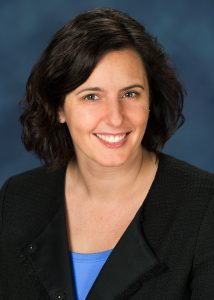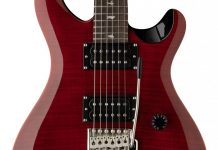 Front and Center: Erica Richstad, Manager, Applications Engineering At Dolby
Front and Center: Erica Richstad, Manager, Applications Engineering At Dolby
By Myki Angeline
Dolby Laboratories specializes in audio noise reduction and audio encoding/compression, and licenses its technologies to consumer electronics manufacturers. Most of us are familiar with Dolby technology in movie theaters, giving us an incredible sound experience.
As Manager, Applications Engineering for the company, Erica Richstad manages the team responsible for supporting manufacturers of home electronic products such as Blue-Ray players, TVs and AVRs that utilize Dolby technology.
A musician herself, Richstad loves percussion and currently plays with the San Francisco Wind Ensemble. We sat down with her to learn more about her career in the audio industry, how she overcomes gender bias, the time she recorded an album at the legendary Skywalker Ranch, and what Dolby is doing to encourage young girls and women in sound engineering.
You can learn more about Dolby at dolby.com.
WiMN: What attracted you to the entertainment industry, and specifically to your current position with Dolby?
ER: I had always been interested in science and engineering. I liked puzzles better than dolls, and circuits better than board games, but I have always loved music also. A friend and I used to record ourselves playing in middle school with a cassette deck. It had that big red button, and I just thought the whole thing was so cool.
Years later, that same friend told me about a college where I could dual major in music performance and recording arts and sciences, which is where I ended up going. My career took me out of recording arts for a while, but when another friend from college called me ten years later about an open position on his team at Dolby, I jumped at the opportunity to re-enter the industry.
WiMN: What was your career prior to working in this industry? What made you make the switch, and how do you feel your previous experience has helped you with your career at Dolby?
ER: I’ve always worked in some aspect of the entertainment industry. In fact, my first job was at a record store. Right now, I work on sight and sound experiences at Dolby, but previously I worked in the DVD/Blu-ray industry in Los Angeles, and before that I interned at a loudspeaker company on the east coast.
I had encountered Dolby technology in every previous job: in college I learned about the history of Dolby noise reduction as it related to analog tape recording (yes, I actually learned how to record and edit on reel-to-reel!), Dolby decoding technology was used in products at the loudspeaker company, and in Los Angeles I programmed encoded Dolby bitstreams for Blu-ray and DVD discs for many major film studios. While I was still working in Los Angeles, a college friend who had landed at Dolby called me up and asked if I had ever considered moving to San Francisco. I hadn’t, but I applied, interviewed, and moved a few months later.
Don’t lose your confidence. And when you make decisions about your career, make them for yourself — not for anyone else.
WiMN: What is your favorite aspect of being with Dolby? What are your primary responsibilities?
ER: Dolby is full of people passionate about technology and creating experiences for people around the world, and I love being around such a diverse and talented group. I manage a team that supports manufacturers of consumer electronics—TVs, Blu-ray players, AVRs, anything you might find in a person’s home. We make sure that manufacturers are applying our technology correctly, so when you watch a movie at home it looks great and sounds awesome, and you know you’re getting the full Dolby experience.
WiMN: You mentioned you are a percussionist. How long have you been playing? Tell us a little about your role with the San Francisco Wind Ensemble.
ER: I’ve been playing ever since my wonderful band director encouraged me to try percussion in the sixth grade. Sometimes it’s just been the occasional show for fun, and sometimes I’ve supported myself with freelancing. I’ve played a lot of Easter services!
In all my decades of playing, the San Francisco Wind Ensemble is the best performing experience I’ve ever had. It was established in 2012 to be the leading professional-level wind ensemble on the West Coast, so the caliber of musicianship is really high. We perform four concerts a year, with one rehearsal Friday, a dress on Saturday, concert Saturday night. Everyone has to be completely prepared, and the short rehearsal time adds an incredible energy to the performances. I’ve been really lucky with the percussion section. When we play together, it’s like we’re all one mind, so it’s no surprise that we’ve all become friends. A couple of summers ago we all went camping together for four days in the middle of nowhere, and now it’s a yearly tradition.
WiMN: Tell us about one of the more meaningful projects you’ve worked on.
ER: I have two. One of the most interesting things I’ve done is help launch our Dolby Vision technology on consumer TVs, which brings extraordinary color, contrast, and brightness to the screen. It’s a huge enhancement of the home, mobile, and cinema viewing experience. My team and I had to ramp up very quickly on technology none of us were very familiar with. It was exciting to learn something new along with my team and be a part of bringing a new cutting-edge technology to consumers globally.
On a more personal level, a couple of years ago I spent two days recording an album with the San Francisco Wind Ensemble at Skywalker Ranch, on the same sound stage where the music for Empire Strikes Back was scored! Recording an album with my favorite group in such a historic space was definitely one of the best experiences of my life.
WiMN: What is Dolby doing to reach female artists and musicians?
ER: Dolby, through its Dolby Cares program, does a lot of work with girls’ and women’s engineering and music groups. The one that is closest to my heart is the Women’s Audio Mission. They reach out to girls in their tween and early teen years —an age where a lot of girls lose confidence and interest in math and science—and encourage them to continue pursuing creative technology. I remember clearly as a 13 year-old suddenly becoming really self-conscious about playing on a drum set, and it took a long time—years—to get that confidence back. If we can support girls going through that kind of confidence crisis, the entertainment and technology industry could look a lot different.
WiMN: Have you ever faced adversity in the music industry simply for being a woman? If so, how did you overcome it?
ER: Percussion and engineering both skew heavily male, and I definitely had to work harder to “prove” myself. I don’t think that has changed. I still feel it when I go to conferences or meet a new group of industry peers. Besides that, I do get the usual “young lady” and “you’re just like my wife” comments when I’m perceived as being difficult.
You ask how I overcame it, and I wish I had an easy answer. The answer is, I just gained enough experience to become confident in my work and around my peers. I once heard a woman on a panel answer a similar question with (I’m paraphrasing),
“If someone refuses to follow my instructions because I’m a woman, I don’t get mad any more. I just say, ‘you can ignore me, but I’ll just have someone else tell you what to do and you’ll do it anyway…so you may as well do it now.’”
I think about that a lot!
WiMN: What is a little-known fact about you?
ER: I’m great at parallel parking and untangling knots.
WiMN: Do you have advice for young women who might be considering a career in the music industry?
ER: It is very difficult, but my number one piece of advice is don’t lose your confidence. And when you make decisions about your career, make them for yourself—not for anyone else.








